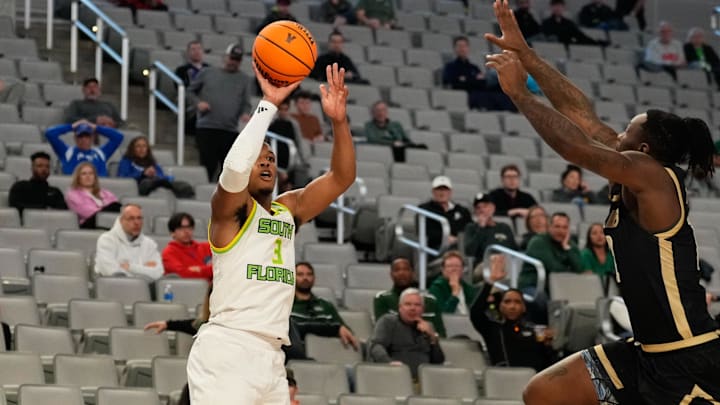Nate Oats told reporters on Thursday that South Florida transfer guard Chris Youngblood had ankle surgery and will miss some time. Oats stated that Youngblood should be 100% by the start of SEC play.
SEC play tips off on January 4th against Oklahoma, but the Crimson Tide play 13 non-conference games before that.
On a deep and competitive roster, no roles have yet been guaranteed. But most believed Youngblood was in line for a starting role next to Mark Sears, Latrell Wrightsell, Grant Nelson, and Rutgers transfer Clifford Omoruyi. With a talented roster, there's a lot of different lineup combinations that Oats will try to figure out his best groups.
Youngblood averaged just over 15 points-per-game and shot 41% from three last season for South Florida en route to being named the Co-Player of the Year in the AAC.
Alabama has the depth to withstand an injury or two, but you never want to see that come to fruition before the games even start. With that in mind, where does Alabama turn to replace the production they figured to get out of an inexperienced combo-guard like Youngblood?
The Veteran Option
With Youngblood, Oats had the option of a starting five exclusively of fifth year players. If he wants to stick with an upperclassmen-laden first-unit, then Pepperdine transfer Houston Mallette could slide into the the three-spot.
Mallette had some injury-related issues over the summer, but he's been with the team practicing this week. He was the first transfer to pledge for Alabama at the end of last season, jumping on board as soon as the portal window opened.
Mallette spent three seasons at Pepperdine, and is a career 37% three-point shooter. He had his best shooting season as a junior, knocking down 40% of 145 attempts.
Mallette was in the 81st percentile taking shots off the dribble, and was at a ridiculous 1.38 points-per-possession (89th percentile) in transition. It's easy to see why Oats and company targeted him with how fast Alabama wants to play. His ability to catch-and-shoot and knock down in-rhythm transition threes is a valuable addition to the roster.
The Young Guys
Mallette might be the safest choice due to his experience, but Alabama has a wealth of young and talented options with a higher ceiling than Mallette.
For starters, Auburn transfer guard Aden Holloway has been turning heads in practice. Putting him in a starting unit alongside Mark Sears and Latrell Wrightsell would give the Crimson Tide a lethal shooting backcourt to space the floor.
Nate Oats: "With Aden (Holloway), Mark (Sears) and Latrell (Wrightsell), we have three of the best shooters in the country in my opinion."
— Blake Byler (@blakebyler45) September 26, 2024
Holloway has been a lights out shooter in practice and was billed as perhaps the best shooter in his high school class, but he had an up-and-down freshman season at Auburn. He shot just 30% from three as a freshman, but clearly struggled with his confidence as the season went on.
Oats will inject him with as much confidence as he can stand, and he'll be in an offense that feels like it was built just for him. The one concern with starting Holloway would be the lack of size in the Tide's backcourt. With Sears, Wrightsell, and Holloway, Alabama would be starting three guys 6'3 or smaller. That might not be as big of a deal with a frontcourt of Nelson and Omoruyi, but they would be sacrificing some defensive versatility.
Providing some similar skills but increased size and athleticism would be freshman guard Labaron Philon, who has been the talk of the summer around Tuscaloosa. Oats recently said that Philon is better than he thought, and the former four-star prospect was in line for a bigger role than most assumed even prior to Youngblood's injury.
The advantage of playing eithe Holloway or Philon in Youngblood's place is it would allow Sears to play a little more off the ball and benefit from catch-and-shoot opportunities that come from their ability to beat defenders off the dribble and get to the rim.
Sears is one of the best shooters in the country, so getting him as many clean looks as you can is a priority.
If Alabama wanted to go even bigger and gain more defensive versatility, then five-star freshman Derrion Reid could start at the three. Reid won't provide the same quickness with the ball in his hands as Philon or Holloway, and he won't be as good of a shooter right away, but he is likely the best defender of those three options. He can switch onto the opponent's primary ball handler and not get lost, and at 6'8 he can hold up in the paint when switched, too.
Alabama has a lot of options, which is a good problem to have. Fortunately, there's two scheduled scrimmages against Wake Forest and Memphis prior to the start of the regular season, and the Tide has three tune-up type games before they go to West Lafayette and play Purdue on November 15th to sort out the starting lineup.
